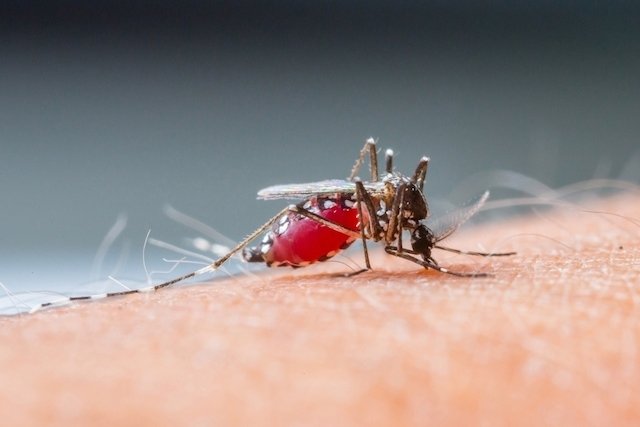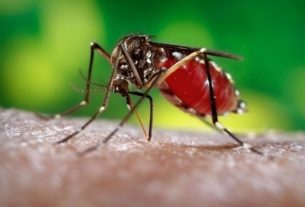Hemorrhagic dengue is a serious complication of classic dengue, which causes an exaggerated inflammatory reaction in the body and changes in blood clotting, resulting in bleeding or hemorrhages, which can be life-threatening.
Hemorrhagic dengue fever is more common in people who have dengue fever for the second time, and can be differentiated from other types of dengue fever around the 3rd day, when in addition to the classic symptoms such as tiredness, eye pain and fever, bleeding from the gums, spots appear red skin or vomiting. See other classic symptoms of dengue.
Despite being serious, dengue hemorrhagic fever can be cured when it is identified at an early stage. The treatment mainly involves hydration through injection of serum into the vein, and for this it is necessary for the person to be admitted to the hospital, as it is also possible for them to be monitored by the medical and nursing team, avoiding the emergence of complications.

Symptoms of dengue hemorrhagic fever
The main symptoms of dengue hemorrhagic fever are:
- Red spots on the skin;
- Bleeding from the gums, mouth, nose, ears or intestines;
- Persistent vomiting, which may contain blood;
- Severe abdominal pain;
- Cold and damp skin;
- Dry mouth and constant feeling of thirst;
- Urine with blood;
- Mental confusion;
- Red eyes;
- Difficulty breathing or rapid breathing;
- Change in heartbeat.
Initially, the symptoms of hemorrhagic dengue are the same as those of common dengue, however, after about 3 days, more serious signs and symptoms may appear.
Although bleeding is characteristic of dengue hemorrhagic fever, in some cases it may not occur, which ends up making diagnosis difficult and delaying the start of treatment. Therefore, whenever signs and symptoms indicative of dengue fever are noticed, it is important to go to the hospital, regardless of its type.
Don’t ignore your symptoms!
How to confirm the diagnosis
The diagnosis of dengue hemorrhagic fever can be made by observing the symptoms of the disease, but to confirm the diagnosis the doctor may order a blood test and the tie test, which is done by observing more than 20 red dots in a square of 2.5 x 2.5 cm drawn on the skin, after 5 minutes of the arm slightly tightened with a tape. Understand how the lasso test is performed.
In addition, it may also be recommended to carry out other diagnostic tests in order to check the severity of the disease, such as a blood count and coagulogram, for example. Check out the main tests to diagnose dengue.
Causes of dengue hemorrhagic fever
Dengue hemorrhagic fever is caused by mosquito bites Temples of the Egyptians that transmits the dengue virus. In most cases of hemorrhagic dengue fever, the person has had dengue fever before and when they are infected with the virus again, they develop more severe symptoms, resulting in this type of dengue fever.
However, some people who have never had dengue may already have the most serious form of the disease.
Furthermore, the use of some medications that have not been recommended by the doctor for the treatment of dengue can favor the development of dengue hemorrhagic fever, as they can stimulate bleeding and lead to complications.
How the treatment is carried out
The treatment of dengue hemorrhagic fever must be guided by a general practitioner and/or an infectious disease specialist and must be carried out in the hospital, as hydration directly into the vein and monitoring of the person is necessary, as in addition to dehydration it is possible for liver and heart changes to occur. , respiratory or blood.
It is important that treatment for dengue hemorrhagic fever begins within the first 24 hours after symptoms appear, and oxygen therapy and blood transfusions may be necessary.
It is recommended to avoid the use of acetylsalicylic acid-based medications, such as AAS and anti-inflammatories such as Ibuprofen, if dengue fever is suspected.
How to prevent
The best way to prevent dengue hemorrhagic fever is to take the dengue vaccine, as it protects against the most common serotypes of the dengue virus, avoiding a severe form of the disease. Find out where and when to get the dengue vaccine.
Furthermore, to prevent dengue, whether classic or hemorrhagic, it is important to avoid accumulating water in lids, tires, vases or bottles, as they facilitate the development of mosquitoes. See other ways to prevent dengue fever.
Common questions about dengue hemorrhagic fever
Below, we indicate the main doubts about dengue hemorrhagic fever:
1. Is dengue hemorrhagic fever contagious?
Hemorrhagic dengue fever is not contagious, as like any other type of dengue fever, a mosquito bite is required. Temples of the Egyptians infected with the virus to develop the disease. Therefore, to prevent mosquito bites and the emergence of dengue fever, it is important to:
- Avoid places where dengue epidemics occur;
- Use repellents daily;
- Light a citronella-scented candle in each room of the house to ward off mosquitoes;
- Place protective screens on all windows and doors to prevent mosquitoes from entering the home;
- Consume foods with vitamin K that help with blood clotting such as broccoli, cabbage, turnip greens and lettuce that help prevent dengue hemorrhagic fever.
- Respect all clinical guidelines regarding dengue prevention, avoiding places where the dengue mosquito breeds, and not leaving clean or dirty water standing anywhere.
These measures are important and must be followed by the entire population in order to reduce dengue cases in the country.
2. Does hemorrhagic dengue kill?
Dengue hemorrhagic fever is a very serious disease that must be treated in hospital because it is necessary to administer medication directly into the vein and use an oxygen mask in some cases. If treatment is not started or not carried out correctly, dengue hemorrhagic fever can lead to death.
According to the severity, dengue hemorrhagic fever can be classified into 4 degrees, in which in the mildest the symptoms are milder, and bleeding may not be observed, despite the loop test being positive, and in the most severe cases there may be shock syndrome associated with dengue fever, increasing the risk of death.
3. Is it never dengue hemorrhagic fever for the first time?
Despite being rarer, dengue hemorrhagic fever can appear in people who have never had dengue fever, in which case babies are the most affected. Although it is not yet known exactly why this can happen, it is known that the person’s antibodies can bind to the virus, but cannot neutralize it and therefore it continues to replicate very quickly and cause serious changes in the body.
In most cases, dengue hemorrhagic fever appears in people who have been infected with the virus at least once.
4. Can it be caused by using the wrong medicine?
The inappropriate use of medicines can also favor the development of dengue hemorrhagic fever, as some medicines based on acetylsalicylic acid, such as ASA and Aspirin, can promote bleeding and hemorrhage, complicating dengue fever. Check out how dengue fever should be treated to avoid complications.
5. Is there a cure for dengue hemorrhagic fever?
Dengue hemorrhagic fever can be cured when it is identified and treated quickly. It is possible to be completely cured, but to do so you need to go to the hospital as soon as the first symptoms of dengue appear, especially if there is a lot of abdominal pain or bleeding from the nose, ears or mouth.
One of the first signs that may indicate dengue hemorrhagic fever is the easy appearance of purple marks on the body, even from small blows, or the appearance of a dark mark in the place where an injection was administered or blood was drawn.

Sign up for our newsletter and stay up to date with exclusive news
that can transform your routine!
Warning: Undefined array key "title" in /home/storelat/public_html/wp-content/plugins/link-whisper-premium/templates/frontend/related-posts.php on line 12
Warning: Undefined array key "title_tag" in /home/storelat/public_html/wp-content/plugins/link-whisper-premium/templates/frontend/related-posts.php on line 13



